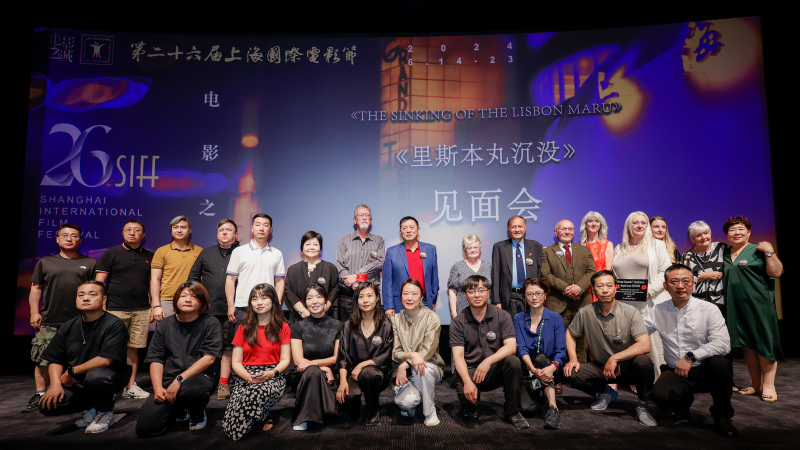Chinese rescue heroism doco opens festival to wide acclaim

By Joyce Xu
Film documentary “The Sinking of the Lisbon Maru” had its world premiere to wide acclaim on Friday (June 14) as the curtain raiser of the 26th Shanghai International Film Festival.
It is already among the most popular movies of the festival’s Film Panorama section. Debuting at Shanghai Film Art Center, tickets sold out within the first 10 minutes when online bookings began on June 7.
It tells the story of how Chinese fishermen risked their lives to save British prisoners of war on a Japanese cargo ship – the Lisbon Maru – after it was torpedoed by an American submarine off Zhoushan, Zhejiang Province, in 1942.
During the 25 hours from the ship being hit to its sinking, the Japanese army sealed all the British prisoners below decks.
However, they were able to break through and jump into the sea but were targeted by Japanese strafing.
At a critical period, around 200 Chinese fishermen from Zhoushan rowed their sampans out to rescue 384 of the beleaguered British floundering in the water, harbouring them later with food, clothing, and shelter.
It took Chinese marine physicist Fang Li seven years to produce the documentary.
His production crew visited the United Kingdom, the United States, Japan, Australia, Hong Kong, and Zhoushan to search for large amounts of related historical material.
On-site interviews are combined in the film with precious historical images and animated depictions of the event to uncover the truth behind this historical rescue which has been largely forgotten for 82 years.
“I decided to find out the truth of this event initially out of curiosity,” said Fang, director and producer.
“Then I found the sunken ship, and at that time there were very few living witnesses to what happened. I realized that I must record it through my camera lens.”
When he ran out of money, Fang sold all his properties to complete the film’s shooting and production.
“It is my commitment to history, and to both the British and Chinese families whose lives are influenced by the sinking of the Lisbon Maru,” said Fang. “Many touching stories about family love are depicted in the film.”
Fang added that he hopes the film conveys a message of peace, as the pain and impact of war on humanity are the same.
The film’s shooting also received support from British scholar Tony Banham, author of “The Sinking of the Lisbon Maru: Britain's Forgotten Wartime Tragedy.”
“When Fang came to me, I knew that this man was serious,” said Banham. “Fang is a physicist, and he is a doer, not a talker.”
The descendants of some British survivors also extended their gratitude to Fang and the documentary crew at the film festival.
Centenarian Dennis Morley, the last British survivor of the ship, passed away in 2021.
His daughter Denise Wynne once wrote a letter to Chinese President Xi Jinping expressing her sincere thanks to the Chinese people for their heroic rescue.
President Xi wrote back and encouraged her and more British people to get involved in maintaining the friendship between China and the UK.
The 75-year-old Wynne, on her first visit to China, said that going to Dongji Island in the East China Sea to see the ruins of the sunken ship had always been her wish, and this time it could be fulfilled.
The film’s premiere received wide acclaim at the film festival and moved many cinemagoers to tears. Some said the touching story about the light and brilliance of humanity was worth watching by everyone.
Taiwan film scholar and critic Peggy Chiao noted that audiences will be impressed by the story’s noble qualities of humanity, people’s strong will to survive, the spirit of mutual assistance, and the touching family affections.
In addition to the great humanitarian rescue, Chiao said the film also depicts the cruelty of war and the invaders.
“The film reveals the worst and best aspects of war,” Chiao said. “It records history and fills a gap in history. Today, all the survivors appearing on screen have passed away. The film’s significance is actually beyond the scope of cinema.”
